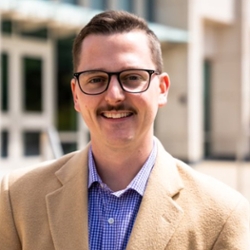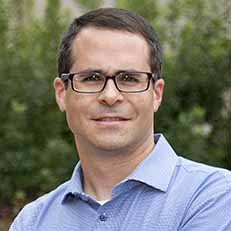BLOOMINGTON, Ind. - People of color, individuals experiencing poverty, families living in under-invested communities, and others often experience more pollution and climate change burdens while having access to fewer amenities, such as parks, or opportunities to enjoy the benefits of a cleaner technologies. They also tend to have less of a voice when it comes to the environmental decisions that impact their well-being.
David Konisky, the Lynton K. Caldwell Professor at the Paul H. O’Neill School of Public and Environmental Affairs, has been working to identify and design policy responses to these environmental injustices for years. Finding solutions to problems is the foundation of Konisky’s career as a researcher, and he set out to help address these issues by empowering students to be part of the solution.
The result was the Environmental Justice Fellows program, which supports graduate students to incorporate the study and consideration of environmental justice into their personal development and practice, their academic experience, and into their future career planning and goals.
“I created the program to further build a community of students at O’Neill who are deeply invested in social justice and equity in the areas of environment, energy, and climate change,” Konisky said. “Our students desire opportunities to engage on these issues outside the classroom, and the Environmental Justice Fellows program provides such a forum.”
The inaugural cohort of 12 fellows recently wrapped up a year participating in programming, conversation, and self-reflection to deepen their understanding of environmental justice issues and to develop personal leadership skills.
The effort seems to have worked.
 “This program helped me understand that environmental justice is not something you have to wait to consider after-the-fact,” said Cody Smith (pictured), who recently graduated with a Master’s degree from O’Neill’s top-ranked public affairs program. “Rather, it’s a lens through which all policy decisions can be guided and evaluated to ensure all stakeholders have power in the decision-making process. For me, this program was a realization that environmental justice is a broad label that has room for everyone and is primarily focused on helping marginalized communities build power.”
“This program helped me understand that environmental justice is not something you have to wait to consider after-the-fact,” said Cody Smith (pictured), who recently graduated with a Master’s degree from O’Neill’s top-ranked public affairs program. “Rather, it’s a lens through which all policy decisions can be guided and evaluated to ensure all stakeholders have power in the decision-making process. For me, this program was a realization that environmental justice is a broad label that has room for everyone and is primarily focused on helping marginalized communities build power.”
Konisky provided year-long mentorship to the EJ Fellows, and exclusive programming and opportunities to network with like-minded experts allowed the students the opportunity to gain a different perspective on the issue.
“It changed my outlook on environmental justice,” said Emily Nash, a recent MPA graduate studying environmental policy and natural resource management with interests in environmental justice, energy systems, and climate change. “I’ve really appreciated being able to meet with and work alongside leaders in the field, stretching across different areas in academia and folks actually on the ground working on these issues in local communities. We’ve been able to discuss injustices at different levels, going beyond national case studies of toxic pollution.
“In all facets of our future careers, there will always be ways to incorporate justice and equity in our daily lives, so long as we are intentional about doing so. I really appreciate having dialogue and learning from my colleagues in this regard, helping each of us recognize environmental justice issues and their implications outside of a pure academic space.”
By bringing together like-minded students, the opportunity for reflection and candor in terms of environmental justice issues was possible, allowing EJ Fellows to better understand some of the underlying causes of issues.
“The Environmental Justice Fellows program exposed me to diverse perspectives and opportunities for engagement and action,” said Steph Jovan, an MPA-MSES student with a concentration on environmental management. “Through the program, I learned more about the policy and advocacy efforts that are underway to address these issues, and that there are people that care greatly about the issues that the marginalized communities experience and will be experiencing in the face of climate change.”
Although the first EJ Fellows cohort has closed out their academic year, Konisky hopes the program is just getting started. For more information about the various fellowships available at the O’Neill School, visit our fellowship page.


